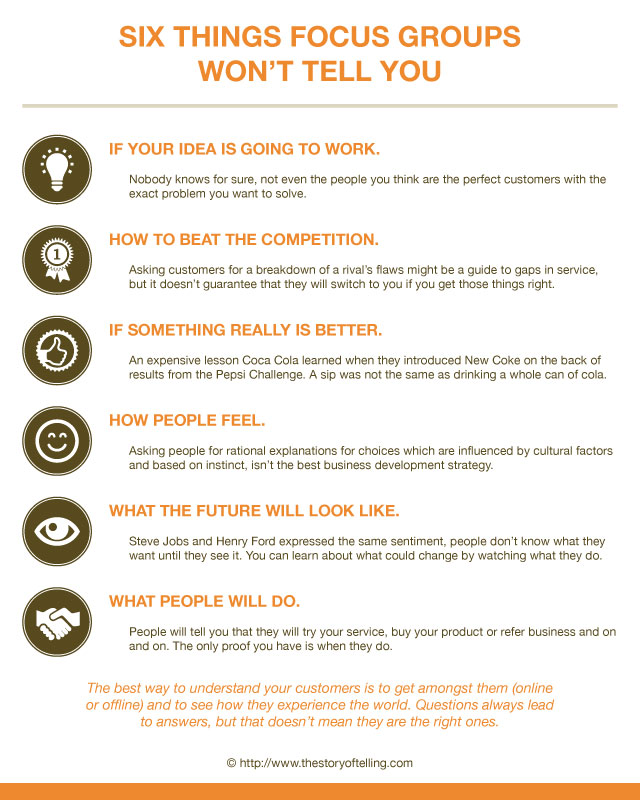Unlock the Magic in Your Story Now
Get the Free 20 questions to Ask Before Launching Your Idea workbook when you sign up for occasional updates.
Get the Free 20 questions to Ask Before Launching Your Idea workbook when you sign up for occasional updates.
The Value Of Connection In A Low Touch World
 What matters in a world where….we can tell a device to order the shopping, place our coffee order without speaking, have a conversation involving thumbs and zero eye contact and before we know it, get to our destination in a driverless car?
What matters in a world where….we can tell a device to order the shopping, place our coffee order without speaking, have a conversation involving thumbs and zero eye contact and before we know it, get to our destination in a driverless car?
What’s scarce today will be even more scarce tomorrow. And that’s our opportunity.
Image by Lena Vasiljeva.
Share this article
Why Visibility Is Overrated

“TRY OUR TAPAS” screamed the sandwich board on the pavement outside the empty restaurant as the customers spilled out onto the pavement waiting for tables at the cafe next door. True story.
One of my clients recently did a marketing audit and found that a third of his business came from repeat clients, another third from referrals, and the last third from all of his other marketing efforts combined (things like flyers, speaking engagements, magazines, advertising, sponsorship, radio and on and on). No surprises for guessing what he is doubling down on now.
We all need to look for opportunities to put that ‘y’ in front of ‘our’.
The people you are hoping will become your customers are tired of being asked to see you.
What they desperately want is for you to see them first.
Image by shirokazan.
Share this article
Six Things Focus Groups Won’t Tell You
 If you’re a fan, you may remember the scene in Mad Men where Peggy—fairly new to the job, joins the other girls from the typing pool in a lipstick testing experiment. All the while the ad executives are secretly looking on and taking notes from behind a two way mirror.
If you’re a fan, you may remember the scene in Mad Men where Peggy—fairly new to the job, joins the other girls from the typing pool in a lipstick testing experiment. All the while the ad executives are secretly looking on and taking notes from behind a two way mirror.
The ad guys were smart enough to know that if they showed the lipstick to the girls and asked them a bunch of questions they wouldn’t necessarily get to the truth. Far better to allow them to experience the product, watch what they did and how they reacted.
Mostly when we don’t know what our customers want we ask them.
If you ask the woman who chooses the bright pink lipstick why she liked it she will try to find some rational, fact based explanation to explain her decision. The truth is she may not know why she chose it other than ‘it felt right’ (or maybe it matched her hair), and it probably messes up the spreadsheet. We’re looking for proof and as Rory Sutherland would say, “Numbers however rubbish they are have the appearance of objectivity.”

Photo by Scott Moore.
Share this article
The Trouble With Marketing And The Opportunity For The Future
filed in Marketing, Storytelling, Strategy
 I met with a prospective client recently who had acted on conflicting advice about marketing tactics from a couple of different sources and failed to get the results he’d hoped for.
I met with a prospective client recently who had acted on conflicting advice about marketing tactics from a couple of different sources and failed to get the results he’d hoped for.
“The trouble with marketers is that each one tries to sell you on their solution.” he said. “The SEO guy will tell you that SEO is the answer. The social media agency will say that Facebook marketing is the way to go. The content marketing firm will tell you that content is king.”
“So what do you think I’m here to sell you on.” I asked.
“Well, getting to know your customers and understanding their story, so that we can serve them better, which will make our story better in the long run?” he replied.
The trouble with marketing is that we’ve separated it from everything else we do to serve our customers. We’ve come to regard marketing as something that gets done after the work, to promote the work. But marketing is the work, and the work, if it’s meaningful and relevant should be the promotion. The story we want customers believe is as valuable to our businesses as the products we sell and the services we design.
If we keep trying to use the tactics in isolation just so we can feel like we’re ‘doing marketing’, then we’re killing our own stories along with those of the customers we serve. You don’t want your customers to trip up over your marketing on a ‘super pavement sign’ you want them to experience it in a meaningful way.
Marketing isn’t something you do. It’s something you live—if you choose to.
Image by justified sinner.
Share this article
The Characteristics Of Great Brand Stories
filed in Marketing, Storytelling
 Great brand stories…..
Great brand stories…..
Are rooted in truth.
Created with intention.
Have a bigger purpose beyond a single bottom line.
Add intangible value to something that was once a commodity.
Take time.
Make the customer the hero.
Change how people feel about a product or service.
Start with the customer’s story.
Don’t matter to everyone.
Appeal to the heart twice as much as the head.
Create evangelists and naysayers.
Make people feel like they belong.
Give people something to talk about, but more importantly something to believe in.
Are shared.
Image by György Rétvári.
Share this article
Who Is This Marketing For?
filed in Marketing, Storytelling, Strategy
 Before holding the meeting.
Before holding the meeting.
Before working on the strategy.
Before choosing the medium.
Before building the website.
Before writing a single word of copy.
Ask yourself, “Who is this marketing for?”
If the answer is, “It’s for our shareholders, the board, my boss, or so we can feel safe doing what we’ve always done.”—go back to the drawing board.
If it’s not designed to serve your customers, it’s not marketing.
Image by Stephanie Wallace.
Share this article
What Does Your Marketing Do?
 Marketing is something we do every day and yet we forget to think about the result of what we do beyond how it helps our businesses. We think we design marketing for our customers when mostly we design it to solve an immediate need we have as business owners.
Marketing is something we do every day and yet we forget to think about the result of what we do beyond how it helps our businesses. We think we design marketing for our customers when mostly we design it to solve an immediate need we have as business owners.
When you think about what your marketing does consider these two lists.

We each get to choose which list we operate from when we go to work each day.
Which one are you choosing?
Image by Lord Jim.
Share this article
How To Begin Developing A Product Story
filed in Marketing, Storytelling, Strategy
 While the guy shopping at the hardware store might think he’s comparing the features and benefits of the latest drills what he’s actually doing is imagining all of those shelves beautifully hung.
While the guy shopping at the hardware store might think he’s comparing the features and benefits of the latest drills what he’s actually doing is imagining all of those shelves beautifully hung.
We like to believe that our product story begins with the customer’s relationship to the product, when in actual fact what the customer is focused on is his relationship to himself (in the presence of the product). When he asks himself (or you), “How is this better?” what he really wants to know is, “How does this make me better?”
4 Questions To Ask Before Developing Your Product
1. What’s the change that will happen in your customer because your product exists?
2. How will he look, feel, think and act?
3. What will he say, believe and do once he is using it?
4. How exactly will he be a better version of himself in the presence of this product?
You can make the most technologically advanced drill in the world, but if the product doesn’t match your potential customer’s worldview then you’re going to be stuck spending time and money trying to make him care about it before he ever considers buying it.
Product development doesn’t start with the story of your factory, the technology or even the number of those features and these benefits.
It starts with the customer’s story.
Image by Roben Joyce.
Share this article
The Purpose Of Collecting Data
 Data collection shouldn’t simply be about looking for proof or testing your assumptions. Your questions are not always about collating the right answers, often they are about finding out who the right people are.
Data collection shouldn’t simply be about looking for proof or testing your assumptions. Your questions are not always about collating the right answers, often they are about finding out who the right people are.
The idea isn’t just to get the data, it’s to understand the people who want to be understood. That way you can focus your efforts on taking the people who have raised their hand with you. Then and only then can you say okay this is where we need to go.
Image by Polo Jimenez.
 As marketers we tend to get lost in the tactics like designing flyers, scheduling tweets and growing a Facebook following—this makes us forget the more important stuff.
As marketers we tend to get lost in the tactics like designing flyers, scheduling tweets and growing a Facebook following—this makes us forget the more important stuff.